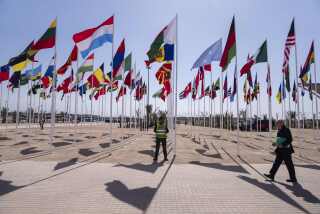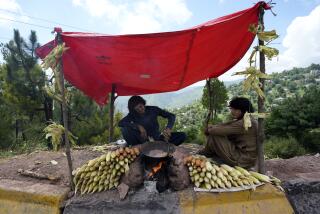Is IMF Prescribing Correct Medicine for the ‘Asian Flu?’
- Share via
WASHINGTON — As the International Monetary Fund orchestrated another mega-bailout of a crisis-ridden Asian economy on Wednesday, some critics say the IMF is prescribing the wrong medicine for the “Asian flu” hobbling the once-powerful region.
Almost uniformly over the last 50 years, the 181-country IMF has lent money to cash-strapped countries only if they first pledged to slash government spending, tighten credit, raise taxes and devalue their currencies.
That medicine generally restored fiscal balance and long-term economic health to the borrowing country--but only after nearly killing the patient with a deep recession.
Now Harvard economist Jeffrey D. Sachs and others argue that the IMF’s traditional cure suited countries whose broad economic policies--typically large budget deficits caused by excessive government spending--were responsible for their ailments.
But the Asians’ biggest headaches, Sachs says, have been caused by private sector excesses, not government overindulgence, and that requires a different sort of cure. If anything, Sachs contends, Asian countries should be permitted to relax their economic restraints and spur their economies ever so slightly to make up for the sudden drying up of foreign capital.
“Our general approach has been to push the Asian problem into the IMF,” he said, “but this is a problem that the institution itself simply can’t handle.”
C. Fred Bergsten, director of the nonpartisan Institute for International Economics here, agrees that the belt-tightening usually demanded by the IMF only makes it more difficult for such countries to repair their financial sectors.
“Do you need as much of the traditional IMF medicine here as you usually have?” he asked. “My suspicion is that there is, at a minimum, overkill, and maybe [the two kinds of remedies] are working at cross-purposes.”
That viewpoint has wide currency in Asia. Malaysian Prime Minister Mahathir Mohamad and South Korea’s top policymakers, among many others, have criticized the IMF as unfairly harsh. Anti-IMF protesters have marched in South Korea, the Philippines and other troubled areas.
Even U.S. Treasury Secretary Robert E. Rubin conceded that the IMF labored under a reputation for “a sort of cookie-cutting approach” in years past. “You obviously raise a very good point,” he said in response to critics.
Nevertheless, Rubin and most private analysts insist that the IMF is still the best physician that the world economy has, and that it has begun revising its prescriptions to target the Asians’ problems more closely.
When Thailand’s financial markets collapsed last August, for example, the fund’s initial package of demands was classic IMF--large government spending cuts, tight money and little to aid the banking sector.
But a revised program hammered out in late November, after IMF diagnosticians got a better look, contained somewhat less rigid budget cuts and paid far more attention to bolstering Thailand’s financial system.
The $18-billion lending plan that the IMF worked out for Indonesia--which is being viewed as a model for IMF programs for other Asian countries--also concentrates heavily on shoring up the country’s fragile banking system.
And the $21-billion IMF program for South Korea announced on Wednesday--part of a $55-billion bailout--while containing some belt-tightening measures, is heavily larded with elixirs for bolstering the country’s weakened financial system.
The South Korean government must stop insisting that banks finance questionable--but politically connected--projects and relax restrictions on the takeover of ailing domestic banks by foreign banks. South Korea must also close several insolvent merchant banks and consolidate or close some shaky commercial banks.
Moreover, while Sachs may be correct in arguing that private sector problems, rather than government policies, are mainly to blame for Asia’s difficulties, IMF officials say that in many cases these stem from flawed government policies.
* In Thailand, which triggered Asia’s turmoil, the government ran up a huge trade deficit and then squandered its reserves vainly trying to support the value of its currency.
* In Indonesia, the government went on a spending binge, financing billions of dollars in construction projects that it now will have to postpone.
* In South Korea, the responsibility for the raft of bad bank loans rests partly with the government, which effectively directed private lending institutions to finance projects of dubious economic merit.
Harvard economist Robert Z. Lawrence argues that no matter how distasteful it may be politically, the Asian economies have nowhere else but the IMF to turn for help in paying foreign creditors and restoring credibility in world financial markets.
With overseas investors wary, the fund is the only institution still willing to provide the money that borrowing countries need to stay afloat, Lawrence says. It is also the only institution equipped to force them to make the structural reforms that they will need to restore their credibility in global financial markets, he says.
“I really don’t see how the Asians could handle this on their own,” without the IMF’s technical help and political pressure, Lawrence said. Without the IMF’s money, he argued, the countries would be far worse off.
To be sure, this is not the first time that the fund has been criticized as too rigid or even wrong-headed in its demands on financially stricken borrowing countries. Top government officials in borrowing countries often cast the IMF as a scapegoat when their own policies are responsible for their economic trouble.
In the late 1970s, when the fund began lending to developing countries, Third World leaders complained that the IMF’s demands were too harsh. The fund did not give in.
When former communist countries began to seek IMF loans in the late 1980s, critics contended that the fund should change its prescriptions for Poland and other “non-market” economies. IMF officials held firm.
This time, when the Asian problems began to surface, the borrowing countries sought to set up a strictly regional rescue program--headed by Japan--that would provide needed loans without the IMF’s tough conditions.
The United States and other major industrial countries balked, however, calling a special conference in Manila that effectively reaffirmed the IMF’s traditional role as the overseer of the bailout.
Meanwhile, Rubin says the IMF is adapting, albeit slowly.
“I think that they’ve dealt with the core issues in Thailand and Indonesia, and that they’ve had effective responses in both,” Rubin said. The key now, he added, “is for the borrowers to keep their commitments.”
More to Read
Inside the business of entertainment
The Wide Shot brings you news, analysis and insights on everything from streaming wars to production — and what it all means for the future.
You may occasionally receive promotional content from the Los Angeles Times.










